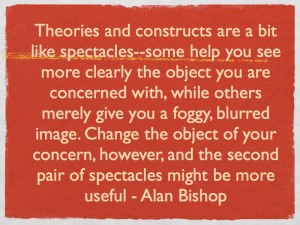A theory in mathematics education research deals with the teaching and learning of mathematics from two perspectives: a structural and a functional perspective.
- Structural – a theory is an organized and coherent system of concepts and notions in mathematics education field
- Functional – a theory is a system of tools that permit speculation about some reality. When theory is used as a tool, it can serve to:
- conceive of ways to improve the teaching/learning environment including the curriculum,
- develop methodology,
- describe, interpret, explain, and justify classroom observation and teacher activity,
- transform practical problems to research problems,
- define different step in the study of a research problem, and
- generate knowledge.
I love this description by Alan Bishop on the role of theory in education research:
Click Theories of Learning for brief descriptions of the four major theories for designing, explaining, and analyzing teaching and learning.
Reference:
Theories of Mathematics Education: Seeking New Frontiers (Advances in Mathematics Education) by L. English and B. Sriraman.
